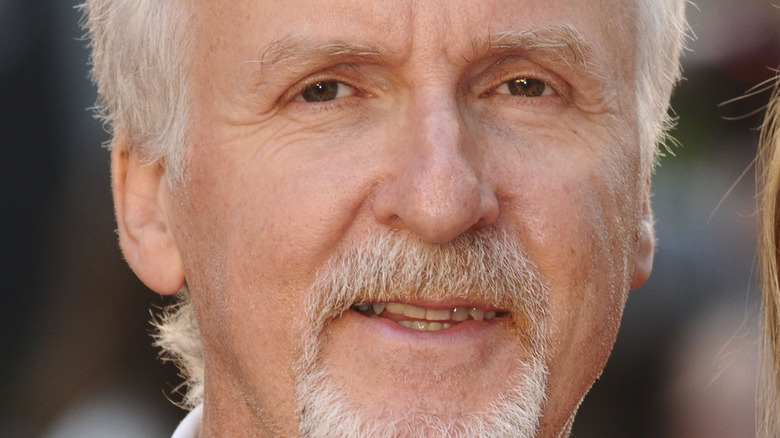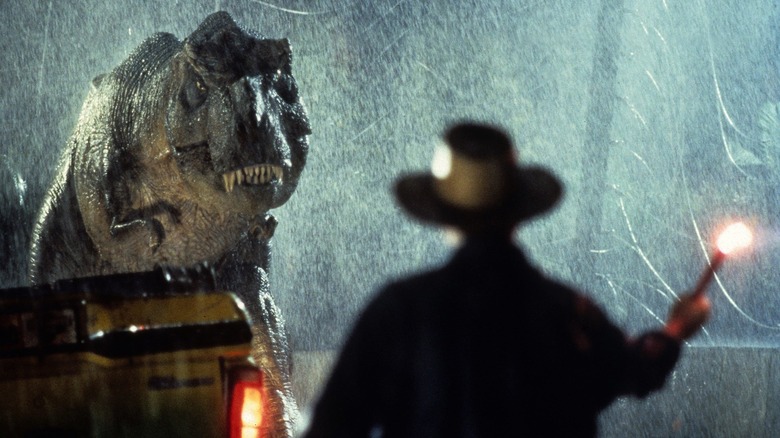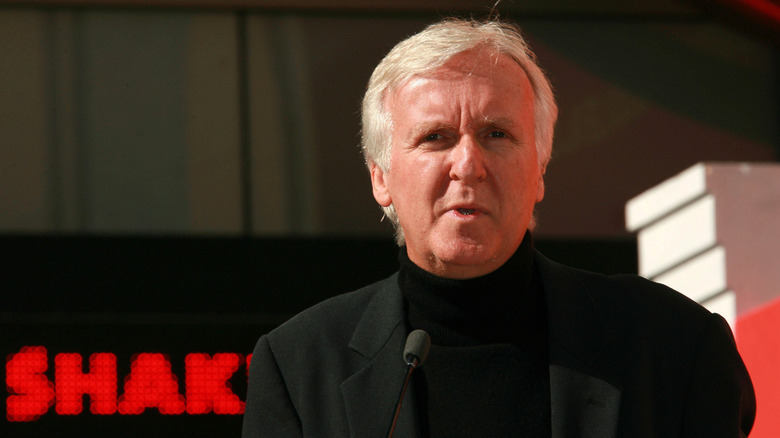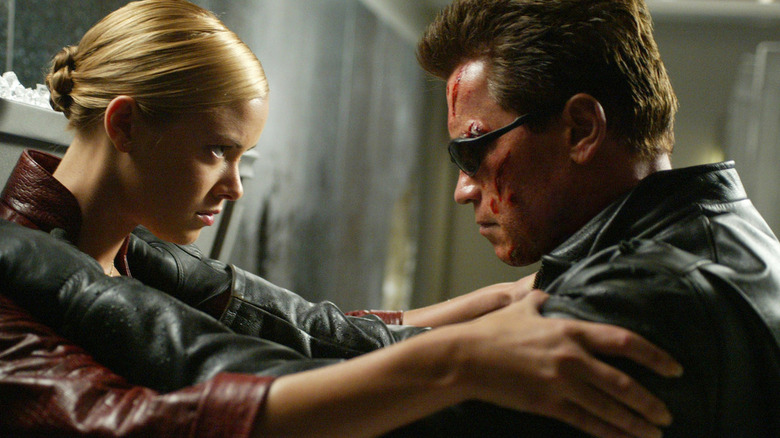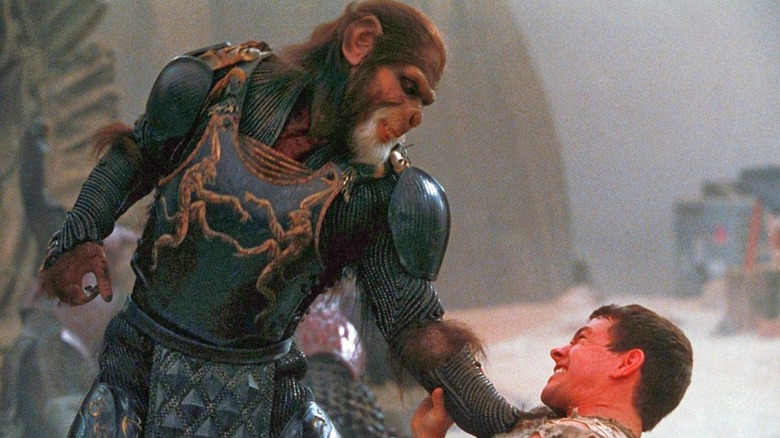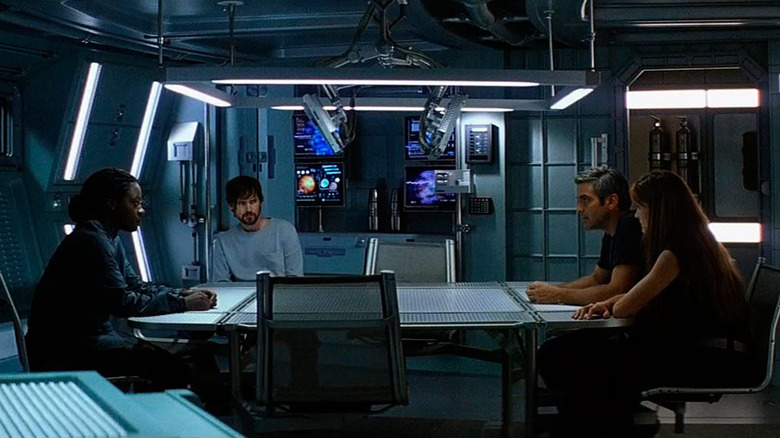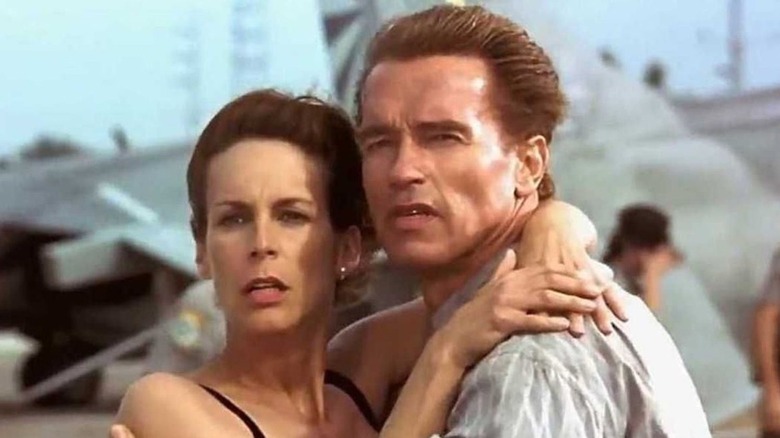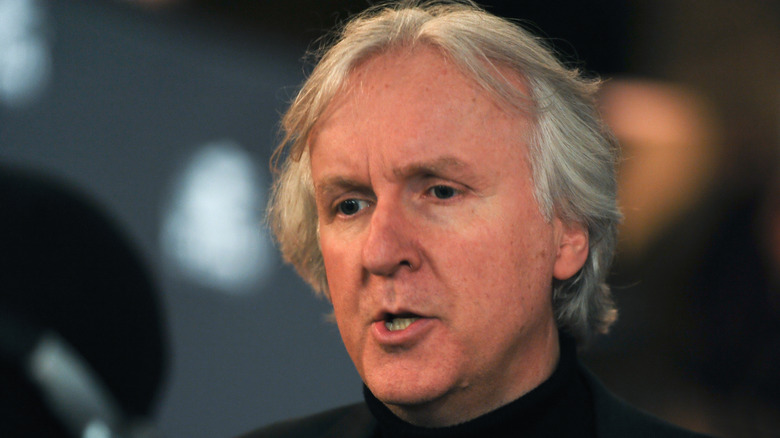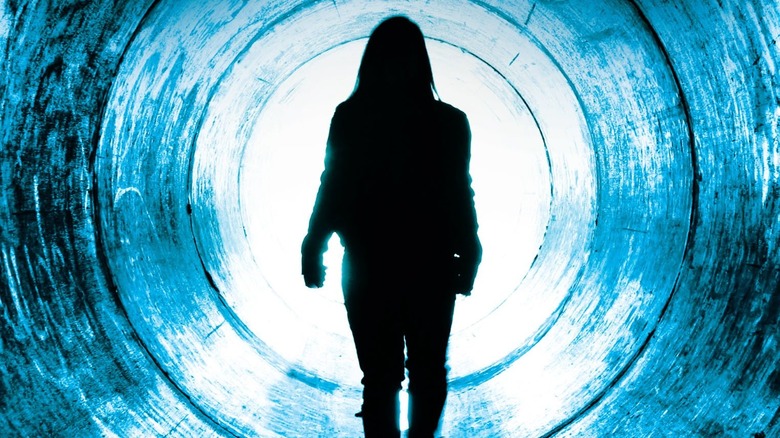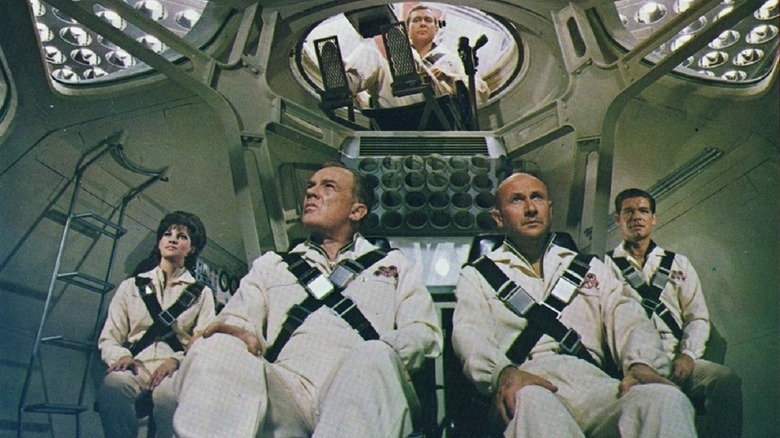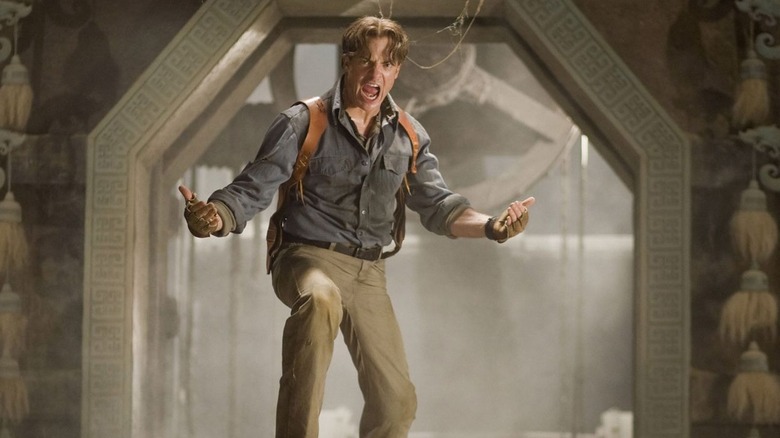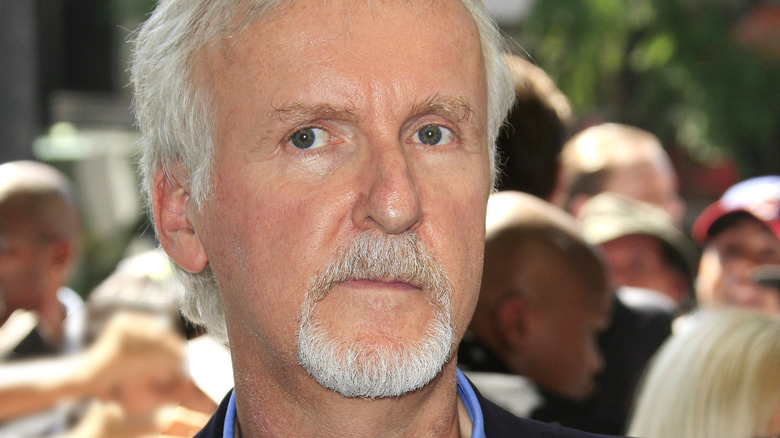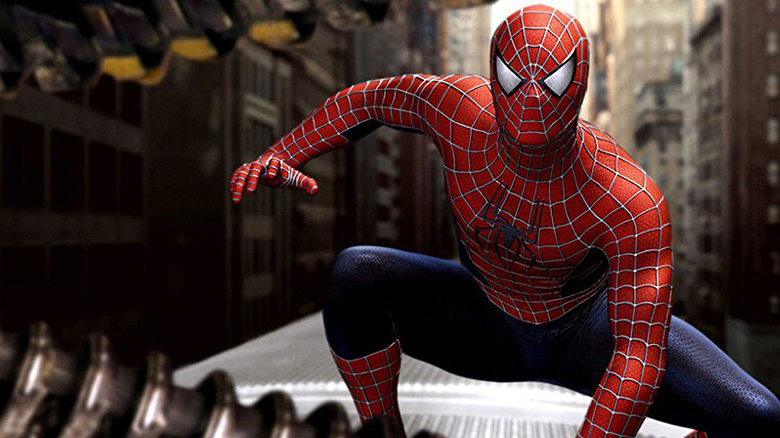James Cameron Movies We'll Never Get To See
We may receive a commission on purchases made from links.
James Cameron is a rare modern filmmaker who's unquestionably a household name, but he doesn't have a gargantuan amount of movies on his resume. That's not a bad thing, though: his choosy nature means that it feels like an event when he does direct something new, while the films he has helmed stand out all the more in the public imagination. Who needs to direct features annually when you've got productions like "Titanic" or the first two "Terminator" movies under your belt? But just because Cameron doesn't put out a new movie every year, or even every five years, doesn't mean he hasn't been attached to direct a slew of different motion pictures in his prolonged time in Hollywood. Countless movies once seemed like they'd be the next Cameron box office juggernaut only to never materialize.
Such prospective projects range wildly from proposed versions of summer blockbusters audiences got to see from other filmmakers to adaptations of major pieces of literature and even some original concepts that Cameron, in theory, could have spun into gold. Though they differ remarkably in plot, tone, and genre, these productions all share the common theme of being unmade directorial efforts from the king of the filmmaking world.
Jurassic Park
Today, the film "Jurassic Park" is inextricably linked to Steven Spielberg. His control of both wonder and terror made him the ideal artist to bring to life a story about a dinosaur theme park that goes horribly haywire. However, when the "Jurassic Park" property was still a Michael Crichton novel, it was anybody's guess who could direct it. According to the book "The Making of Jurassic Park," several studios and notable filmmakers threw their hats into the ring to score the film rights to this text, including Joe Dante and Richard Donner, two men with plenty of experience in helming blockbusters.
Then there was James Cameron, who revealed to HuffPost in 2012 that he was so taken by the story of "Jurassic Park" that he pursued the film rights himself when they went up for sale. It's no surprise Cameron would find "Jurassic Park" up his alley, given his love for science and horror-tinged storytelling. Cameron's version would have taken the central "Jurassic Park" premise to the extreme by being heavy on violence and aimed at older viewers. Spielberg eventually snatched up the rights instead, with the man behind "Raiders of the Lost Ark" beating Cameron to the punch "by a few hours." Apparently there were no hard feelings, with Cameron having nothing but positive remarks for Spielberg's "Jurassic Park" and even claiming that the latter's all-ages approach to the adaptation was the correct way to go.
The Crowded Room
Every day, people get acquitted of crimes for a multitude of reasons. However, Billy Milligan made history by being declared innocent after claiming insanity due to his multiple personality disorder. This inspired a popular book, "The Crowded Room," that Hollywood has been trying to adapt for decades. Among those who tried their hand at bringing this tale to the silver screen? James Cameron.
The filmmaker purchased the rights to this book in the early 1990s shortly after "Terminator 2: Judgment Day" took his career to a whole new level of acclaim and box office success. John Cusack was set to star in this version, marking the actor's first time working with Cameron. This would have been the most grounded project yet for Cameron at this point in his career, with his directorial efforts at this juncture focusing on underwater alien spacecraft and killer robots from the future rather than real people grappling with mental health conditions.
However, "The Crowded Room" never got off the ground due to legal wrangling between Cameron, 20th Century Fox and the producer who held the rights. Since then, there have been multiple other attempts to turn this man's life into a feature, including one that was set to star Leonardo DiCaprio. The most recent of these attempts has taken this tale to the small screen, in the form of a proposed Apple TV+ series starring Tom Holland. Only time will tell if Holland has more luck in Cameron in cracking this adaptation.
Terminator 3
In 1996, just as the "Terminator 2" theme park ride was opening at Universal Studios Florida, some important news for the "Terminator" franchise broke out. According to People magazine (via Deseret News), Cameron had started writing a screenplay for "Terminator 3." Despite previous reports that he had no interest in doing further installments in this series, the man behind the "Terminator" franchise was back in the game and original cast members like Arnold Schwarzenegger were intrigued about returning as well.
At the time, it was noted that Cameron's "Terminator 3" would hit theaters well in the future thanks to his commitments on "Titanic." Unfortunately, further complications — in the form of legal issues surrounding the sequel rights to "Terminator" movies — would forever shelve the project. The rights went up for sale when the production company Carolco went bankrupt. Cameron initially pursued them with 20th Century Fox. On paper, it sounded like a perfect project to fit into Cameron's long-term studio contract with Fox. But by October 1997, these plans were scuttled once it became clear that the combined cost of acquiring the rights and then financing a third "Terminator" blockbuster would be exorbitantly expensive.
With this development, Cameron walked away from "Terminator 3." Though this project would eventually find its way to theaters as "Terminator 3: Rise of the Machines," directed by Jonathan Mostow, moviegoers would never again see a "Terminator" title helmed by James Cameron — although he later got the rights back and produced 2019's "Terminator: Dark Fate."
Planet of the Apes
The 2001 "Planet of the Apes" remake was plagued by constant shifts in filmmaker and creative direction in its long journey to the big screen. Among those who worked on the film was James Cameron, who came aboard in the late 1990s to take a swing at a new interpretation of this classic film. Cameron's version of the project would have allegedly starred Arnold Schwarzenegger, a regular in the director's filmography, though he'd been cast long before the man behind "Aliens" stepped in to salvage "Planet of the Apes."
Concrete story details on Cameron's take on "Planet of the Apes" have remained a mystery for years, save for recurring rumors, though this particular production would have reportedly occupied the same continuity as the original "Planet of the Apes" series. Despite the major coup of getting a filmmaker of Cameron's caliber to work on the project, Cameron would eventually depart the production due to creative disputes with the producers as well as his obligations to "Titanic." It's impossible to know what Cameron's idea of "Planet of the Apes" might have looked like, but given the dismal reviews that greeted the 2001 remake, it's doubtful it could have been worse than what we got.
Solaris
Andrei Tarkovsky's "Solaris" is one of the most seminal science fiction films ever made. If you were to propose an American remake of such a project, you'd have to bring the goods. A shot-for-shot remake or a boring retread that strips away all the interesting parts of "Solaris" wouldn't do. You have to conjure up a bold new vision courtesy of a filmmaker who isn't just there for a paycheck. Enter James Cameron, who, as Steven Soderbergh told the BBC, secured the remake rights to the feature after spending five years chasing them. With that kind of relentless pursuit, Cameron apparently had big plans for the project.
Though his initial plans for helming "Solaris" would have returned Cameron to his favorite domain of science fiction storytelling, he eventually handed over the reins to another director. Upon finding out that Cameron had the rights to "Solaris," Soderbergh approached Cameron and his production company, Lightstorm Entertainment, with a vivid vision of what a remake could look like. Impressed by Soderbergh's concepts for this project, Cameron handed the directorial reins over to the man behind "Ocean's Eleven," resulting in the 2002 motion picture "Solaris."
True Lies 2
It may not be quite as famous as "Titanic" or "The Terminator," but James Cameron's action comedy "True Lies" was a big hit in its original 1994 release. Arnold Schwarzenegger was an unstoppable box office titan at the time, and reuniting him with the director behind the two "Terminator" projects proved to be catnip for audiences. It proved so popular that, in standard Hollywood fashion, a follow-up was developed in the form of "True Lies 2."
This production had a whole script written and garnered the interest of principal actors from the original film, including Schwarzenegger, Jamie Lee Curtis, and Tom Arnold. As late as March 2001, Schwarzenegger was talking to IGN about the quality of this screenplay and expressing excitement over the prospect of working with actors like Curtis again.
However, some key obstacles kept it from ever happening. For one thing, Cameron's plate got extremely full as a director in the 21st century as he prepared to launch "Avatar." For another, the political climate after 9/11 also engineered unintended parallels between the horrors of reality and the lighthearted entertainment of "True Lies 2." Most notably, Schwarzenegger revealed in 2003 that one set piece in "True Lies 2" involved a skirmish on an airplane that ended with the aircraft falling to the ground. With this problem dragging the screenplay down, the world of "True Lies," unlike another of Schwarzenegger's most famous characters, would not "be back" on the big screen.
The Last Train to Hiroshima: The Survivors Look Back
Much of James Cameron's career has been centered on fantastical stories that could only be accomplished in the medium of genre storytelling. But "Titanic" also indicated a fondness for historical dramas. This was terrain Cameron once seemed poised to explore once again with the film "The Last Train from Hiroshima: The Survivors Look Back." As the title would suggest, this film would have focused on Tsutomu Yamaguchi, a man who managed the miraculous feat of surviving both the bombing of Hiroshima and Nagasaki.
Cameron confirmed in August 2010 that he was fully committed to the project and had even talked with the real-life Yamaguchi so that this prospective film could be accurate to his experience. However, at the time, he was already expressing uncertainty over whether or not he could pull this film off. For one thing, he found himself unsure of his ability to nail a proper tone for this story, while also worrying that using digital 3D (a format he had fully committed to after using it on "Avatar") to realize this story would render it "too sensationalistic." With these problems weighing on his mind, not to mention his inability to commit to a concrete timeframe of when to release it, it's no wonder Cameron's "Hiroshima" movie never made any significant headway.
The Informationist
Three years after "Avatar," James Cameron's image in the public eye was that of a reigning king. Having directed the two biggest films of all time (at that point) back-to-back, Cameron could do anything he wanted. At that moment, the world knew he was hard at work on a series of "Avatar" sequels. However, in October 2012, Cameron added a new directorial effort to his to-do list in the form of "The Informationist." This would have been based on a Taylor Stevens novel of the same name, concerning a young girl growing up in Cameroon who eventually works with a group of mercenaries and becomes a seller of information to the highest bidder.
At the time, Cameron said he would be tackling the project, but that he wouldn't start rolling the cameras on "The Informationist" until he was done with his "Avatar" sequels. To give an idea of how long ago this project was announced, this was back when Cameron was still planning to do just two "Avatar" follow-ups. Since then, those plans have expanded to include a whole quartet of "Avatar" movies set to come out through 2028. As for "The Informationist," no further information has come out on the movie, making it likely this was put on the backburner so Cameron could concentrate on the stories of Pandora.
Fantastic Voyage
"Fantastic Voyage" isn't the most beloved science fiction movie of all time, but its unique premise (concerning a group of people who shrink down to microscopic size and travel inside a human's body) is decidedly high-concept enough to ensure that Hollywood is constantly trying its hand at remaking this property. Among those that have often attempted to revitalize the project is James Cameron, whose affinity for visual effects-heavy movies would serve a project like this perfectly.
Cameron penned a screenplay for "Fantastic Voyage" in the 1990s and planned to direct it before opting to have someone else helm it. Among those considered for the endeavor was Roland Emmerich, who responded negatively to Cameron's script. The film has been revived on-and-off over the years, most recently with Guillermo del Toro pursuing a version of the project in 2016 that Cameron would have produced. Despite carrying an idiosyncratic logline and the passion of someone as influential as James Cameron, a new "Fantastic Voyage" has yet to set sail.
The Mummy
We all know the 1999 Stephen Sommers movie "The Mummy." A big hit in its theatrical release, the film is fondly remembered today for making the most out of winning star turns from Brendan Fraser and Rachel Weisz, not to mention an infectious sense of fun. Before this production arrived, however, it looked like another motion picture titled "The Mummy" would be hitting theaters in the 1990s, courtesy of James Cameron.
This prospective film only shared a name with Fraser's "The Mummy," since Cameron's movie was not based on the classic Universal monster. Instead, this production would have been based on a 1989 novel by Anne Rice, for which 20th Century Fox scooped up the film rights in 1996. This would have been an intriguing project for Cameron given that it would have taken the filmmaker into the territory of fantasy, a genre he's far less experienced with than sci-fi. Then again, the project would have also featured horror elements, a realm he was incredibly comfortable with after "The Terminator" and "Aliens."
Despite Cameron's involvement, "The Mummy" never rose from its tomb despite tons of cash being forked over to buy the film rights. Cameron's obligations to "Titanic" likely kept this filmmaker busy, but it also didn't help that "The Mummy" — a very different version — would end up becoming a pop culture sensation in 1999.
Doomsday Protocol
For decades, James Cameron and 20th Century Fox have been joined at the hip, with this partnership dating back to a creative pact signed by Cameron and Fox following the enormous success of "Terminator 2: Judgment Day" in 1991. Merging these two Hollywood forces together has resulted in projects ranging from "True Lies" to "Titanic" to "Avatar," as well as films only produced by Cameron, such as "Alita: Battle Angel." Given the strong track record Cameron has had with Fox, it's no surprise that, in the days leading up to the debut of "Avatar," the studio was looking to gear up a new film for the auteur.
In December 2009, news broke that Cameron had set up a film at Fox called "Doomsday Protocol," which was seen as a potential sci-fi tentpole. Earlier news reports over a Fox-purchased script with the same name revealed plot details for the ambitious project, which would have centered on a group of human and aliens coming together to save Earth from annihilation. It's easy to see why such a project would work well to Cameron's sensibilities, given his love for sci-fi and stories about humans working alongside decidedly non-human beings. However, no further news ever emerged on this project, likely as a result of Cameron focusing on his array of "Avatar" sequels.
Spider-Man
Though "Blade" was the start of live-action adaptations of Marvel Comics characters getting taken seriously in the public consciousness, Sam Raimi's 2002 movie "Spider-Man" proved they could become pop culture behemoths that smashed box office records. This project was a massive hit by any measure, but one can't help but wonder if a Marvel movie would have reached that level of success even earlier if James Cameron had gotten his proposed "Spider-Man" movie off the ground in the 1990s.
Cameron penned a script for this project in the early '90s when the rights were acquired by "Terminator 2" production company Carolco. As part of his plans for getting "Spider-Man" rolling, Cameron was even eyeballing future "Titanic" leading man Leonardo DiCaprio for the titular role. An IGN review of the "scriptment" penned by Cameron revealed several tantalizing details about the production, including that Sandman and Electro were the main bad guys.
Like many proposed Marvel adaptations in this era, legal issues related to the film rights kept the feature from taking off. As revealed in a rundown by the Los Angeles Times, this lengthy feud ended with Sony/Columbia Pictures taking on the film rights to "Spider-Man" and Cameron, fresh off "Titanic," moving on to other projects. It's a shame Cameron couldn't get his vision realized, but considering how good Raimi's "Spider-Man" movies turned out, there are certainly worse outcomes to his "Spider-Man" going belly-up.
